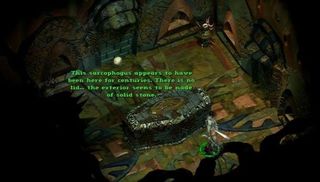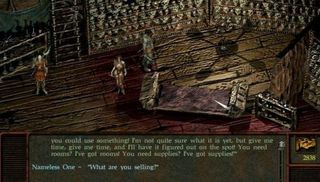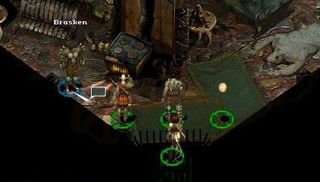Planescape: Torment delivered on its promise, a whip-smart game about 'philosophers with clubs'
Reinstall – Planescape: Torment.

Reinstall invites you to join us in revisiting classics of PC gaming days gone by. This week, Richard Cobbett delves into the questions of human nature while beating up monsters in Planescape: Torment.
Most RPGs give you a quest. Torment gives you a question: "What can change the nature of a man?" It's not a riddle. It's not a puzzle. It's simply the first hint that you're about to embark on the smartest, most philosophical quest of your life.
Torment is the story of The Nameless One, a grey, scarred immortal who wakes up with amnesia on a mortuary slab in the middle of a filthy city built on filth, fear and backstabbing. With the help of a cheerful, slightly perverted skull called Morte, he soon discovers that he's an immortal trapped in an endless cycle of death and rebirth. The Nameless One has lived good lives. He's lived terrible ones. His one constant is that wherever he goes, pain follows, along with a ruthless enemy willing to do anything to keep him from breaking his curse.
Given its cult status now, it's hard to remember that nobody had much hope for Torment when it first came out. It had the most boring trailer ever created. The launch announcement was a badly rendered girl wearing nothing but a few strips of strategic red leather, with The Nameless One described as simply "a corpse with irresistible sexual charisma."
Ouch. Bad start.
Risking a purchase anyway, mostly because it was a Black Isle game (Fallout) using the Infinity Engine (Baldur's Gate), Torment quickly exploded to the point that even after replaying it several times, I barely know where to start telling you about it. Maybe with a story about Ravel, the wicked witch tired of cruelty? Fall-From-Grace, a puritan succubus who runs a brothel for sating the mind? The brutal humor? The sadness of Deionnara, the still obsessed ghost of a woman broken by The Nameless One in a past life? The endless layers of detail?

I could, but instead, let me share the moment Planescape really clicked for me. To be honest, up to this point, I wasn't enjoying it much. I was lost, frustrated, and had no idea what the hell I was meant to be doing. Then I met Mebbeth.
Comic deals, prizes and latest news
Sign up to get the best content of the week, and great gaming deals, as picked by the editors.
Mebbeth is a witch, willing to share what “little” she knows of the Art...but only if you agree to help her with some quick chores. The first is to get some seeds from the market. Unfortunately, the seed merchant doesn't have the ones you need, so you need to find another character who can will the original tree back into existence for you.
O-kay. Time for magic?
No. Not yet. Returning, Mebbeth remembers there was something else she needed from the market—her laundry. Unfortunately, the merchant who does her washing has had her sheets for years, and has washed and rewashed them so many times that they feel like cardboard. Luckily, Mebbeth doesn't mind. She just sends you back to the market, this time to retrieve ink.

Tedious, time-wasting nonsense? In most games, it would be. But this is Planescape: Torment—the smartest RPG of all time. When you get back this time, Mebbeth asks what you learned. And it clicks. Your first errand was a direct demonstration of the power of belief in the Planescape universe. The second is a more in-character warning against ritual without purpose. The third, in context, is about seeing the world through another person's eyes.
What initially seemed like three FedEx quests are suddenly revealed as the mage equivalent of "Wax on, wax off." Those things you collected? Mebbeth makes a frame from the seeds, uses the sheets as pages, and hands you your first spellbook.
This is not an isolated moment of genius. This is Torment, and moments like these are in its bones and in its DNA. It's a game not simply confident in its own intelligence, but that respects yours to the point that it's happy to debate philosophy, to make you uncomfortable, and above all, to make you think.

What can change the nature of a man? As I said at the start, there's no wrong answer. Still, nothing sums up the breadth and wonder of Planescape than this, a short monologue given by The Nameless One to an angry specter:
"If there is anything I have learned in my travels across the Planes, it is that many things may change the nature of a man. Whether regret, or love, or revenge or fear—whatever you believe can change the nature of a man, can. I've seen belief move cities, make men stave off death, and turn an evil hag's heart half-circle. Belief damned a woman, whose heart clung to the hope that another loved her when he did not. Once, it made a man seek immortality and achieve it. And it has made a posturing spirit think it is something more than a part of me..."
There's no replacement for serious, smart storytelling —between Fallout in '97, Fallout 2 in '98, Planescape in '99, and Icewind Dale in '00, Black Isle produced some of the best RPGs of the era. My only regret is that I can't get the kind of targeted amnesia that would let me experience this game all over again for the first time. Torment or not, I suspect it'd be worth it.
Most Popular


